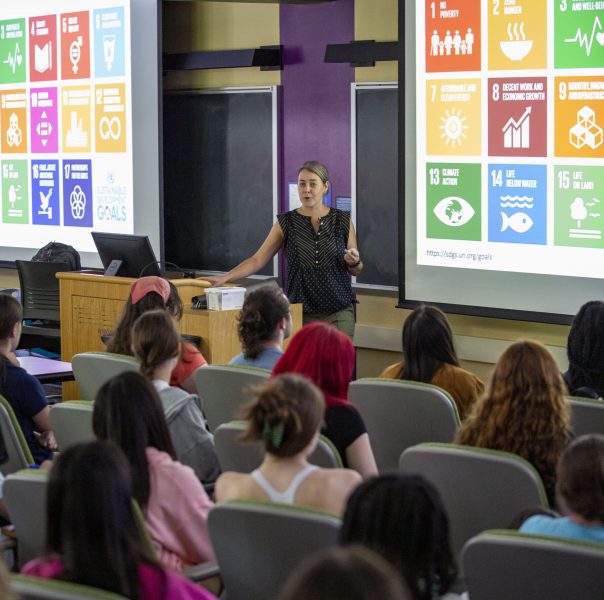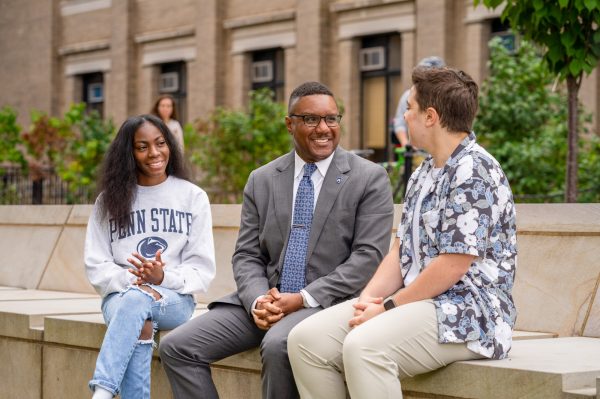
In the fall of 2022, the College of the Liberal Arts chose the theme for its next offering in its Moments of Change initiative—an undertaking that brings students, faculty, staff, and alumni together to explore what it means to live through historic and contemporary times of change.
Through the spring of 2024, Moments of Change: Creating a Livable Planet, is focusing on the many aspects of sustainability and highlighting the ongoing work of the Liberal Arts Sustainability Council, students, faculty, and staff in that regard. Similar to Remembering 1968 in 2018 and A Century of Women’s Activism in 2020, the college has planned an array of courses, lectures, presentations, and events centered around the Creating a Livable Planet theme.
Like its predecessors, this theme was chosen because of the timeliness of the issue. It is not enough to act—we must act now. Delayed efforts to mitigate the problems will have negative, and potentially irreversible, consequences for global warming, rising sea levels, food security, and public health. By addressing these issues, we can create a better world for future generations.
What is sustainability?
Adapted from the Penn State Sustainability Institute
There are many definitions of sustainability. In fact, sustainability can mean different things to different people. For many years, the term “sustainability” equated in some people’s minds with environmentalism—people working to protect the planet from pollution, litter, and chemicals while trying to recycle and reduce their overall footprint on the planet.
While the environment is an important facet in sustainability, it is not the only facet.
Penn State sees sustainability as starting with people. The goal of sustainability is to create a holistic approach to human health, economy, and happiness. A stable and clean environment is an important part of that vision, but so, too, are issues like ending poverty, creating dynamic community infrastructure, and guaranteeing gender equity. Only with all of these components can we guarantee a sustainable future for all people.
Penn State has adopted the following as its formal definition of sustainability:
Sustainability is the simultaneous pursuit of human health and happiness, environmental quality, and economic well-being for current and future generations.
With that definition in mind, the College of the Liberal Arts has planned programming focused on topics like economic, racial, and gender equity and responsible labor practices.

- Association of Water Students at Penn State
- Center for Sustainability Community Garden
- Chesapeake Bay Club at Penn State
- Community Environment and Development Club
- Days for Girls at Penn State
- Eco Action
- Enactus
- Engineers for a Sustainable World
- Environmental Resource Management Society
- Global Water Brigades
- Net Impact Undergraduate Chapter
- Solar Decathlon Team of Penn State
- Student Farm Club
- Student Organization for Sustainable Development Goals
- Student Pad Project at Penn State
- Wind Energy Club
Sustainability Courses
Whether you are an undergraduate or graduate student, a course in sustainability is a great way to broaden your Penn State education. With a greater understanding of the complex concepts related to the seventeen Sustainable Development Goals, including climate action, eliminating hunger and poverty, peaceful and just institutions, and innovation and infrastructure, you can expand your knowledge and gain a fresh perspective.
Read about our previous sustainability courses:
Sustainability Leaders
Shaka Ramanathan, a Paterno Fellow and Schreyer Scholar, is president of Days for Girls at Penn State. She is imajoring in Psychology and double minoring in Women’s Studies and Biology.
Helina Qin is the vice president of the Penn State Net Impact Undergraduate Chapter. She is double majoring in Economics and Finance with a minor in Information Sciences and Technology.
Upcoming Theme Events
Nick Pearson, associate teaching professor of psychology, presents “Psychology, Sustainability, and Circuity: Three Words That Sound Like They Should Start With The Same Letter, And How They Can Save The Planet” for the Liberal Arts First-Year Lecture on August 31, 2023.